Exploring the Defining Years of Generation Z

Introduction
Generation Z, often abbreviated as Gen Z, refers to individuals born roughly between the mid-1990s and the early 2010s. As this demographic increasingly enters adulthood, their experiences during formative years are crucial in understanding their unique perspectives and behaviours. The significance of exploring the defining years of Gen Z lies in their profound impact on various sectors, from technology and fashion to politics and social issues.
Key Characteristics of Gen Z
One of the most notable aspects of Gen Z is their digital nativity. Having grown up in the age of smartphones, social media, and instant communication, they are the first generation to experience constant connectivity from a young age. Studies show that 95% of Gen Z has access to a smartphone, which has not only changed how they interact but also how they learn and process information.
Social Awareness and Activism
Gen Z is marked by heightened awareness of global issues, including climate change, social justice, and mental health. They are more likely to advocate for change and engage in activism compared to previous generations. Recent protests, such as those led by climate activist Greta Thunberg, demonstrate the power of Gen Z mobilising online and offline to impact policy and create awareness about pressing issues.
Education and Employment Trends
Furthermore, the educational aspirations of Gen Z are distinct. Many prioritise education that leads to stable employment. Recent reports indicate that a significant proportion of Gen Z students are concerned about student debt and job security, leading to an increase in the pursuit of vocational training and STEM (Science, Technology, Engineering, and Mathematics) fields. This trend signifies a shift towards practical education and skills-based learning, which is likely to shape future job markets.
Privacy and Digital Footprint
Another defining characteristic of Gen Z is their understanding of privacy and digital footprints. Unlike previous generations, they are more cautious about the information they share online. A study conducted by McKinsey & Company revealed that over 60% of Gen Z members consider their privacy to be a significant concern, highlighting a trend towards valuing personal data safety and digital well-being.
Conclusion
In summary, the years defining Generation Z bring forth a multitude of unique characteristics and behaviours that are reshaping society. With their significant focus on digital engagement, social responsibility, practical education, and privacy concerns, Gen Z is poised to lead future change across various sectors. As they continue to gain influence, understanding their perspectives will be crucial in addressing the challenges and opportunities that lie ahead, not just for them but for society at large.









